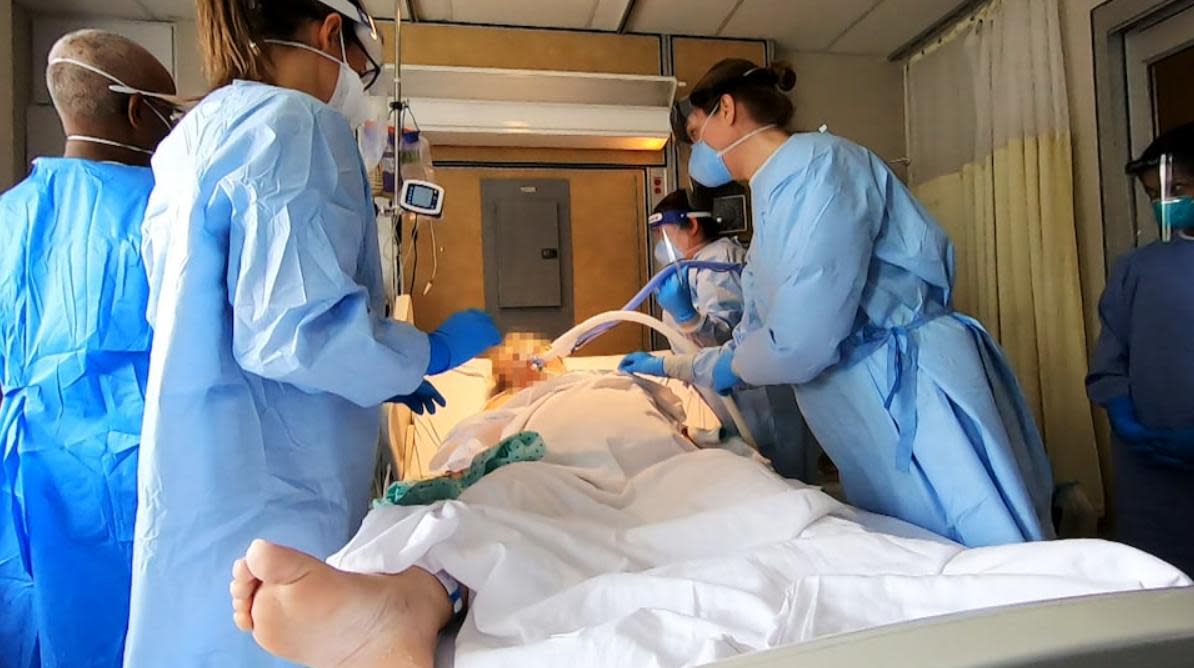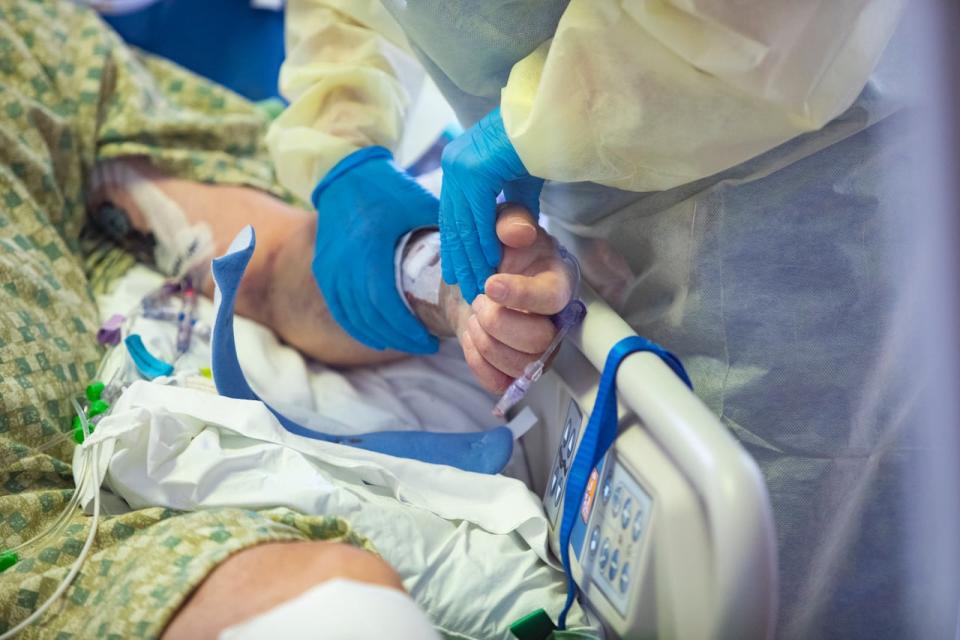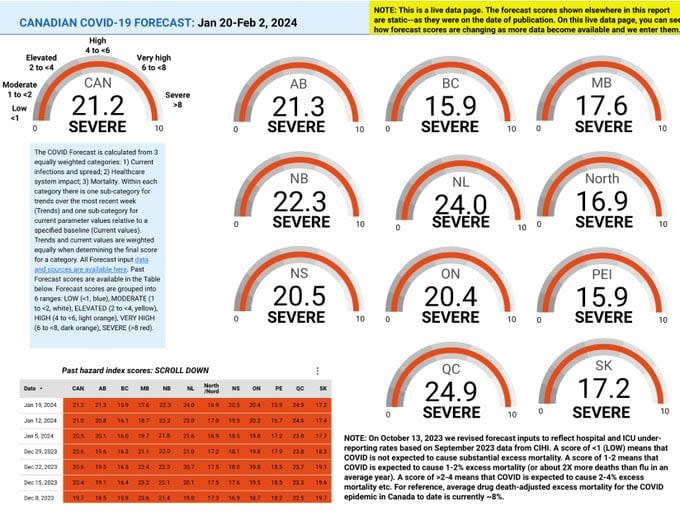New Brunswick's COVID-19 pandemic death toll reaches at least 1,000

Two more deaths from COVID-19 have pushed New Brunswick's official pandemic death toll to 1,000, although the total is likely higher since the province has counted only people who die in hospital as COVID deaths since September.
The two people who died between Jan. 7 and Jan. 13 were both aged 65 or older, according to Tuesday's Respiratory Watch report.
Public Health has reported 1,000 COVID deaths since March 2020, said Department of Health spokesperson Sean Hatchard.
"That includes 64 deaths that have been recorded during the current respiratory illness season that began on Aug. 27, 2023. The total number of COVID deaths prior to this season was 936," he said in an emailed statement.
CBC requested an interview with Dr. Yves Léger, the province's acting chief medical officer of health.
"When there is something new or noteworthy to share with the public, or if its advice or guidance for the public were to change, Public Health ensures staff are available to provide information to the media," Hatchard replied. "That may include an interview or a statement, depending on the individual situation."
Decreases in activity
COVID-19 activity in the province remains "moderate," he said, with "most indicators" decreasing throughout the reporting period.
The report also shows less influenza activity compared to the previous few weeks, said Hatchard, citing decreases in deaths, hospitalizations and cases.
"Public Health expects the viruses to continue circulating in the province throughout the respiratory illness season, and that is why it is important that individuals continue taking precautions to reduce their risk of contracting or spreading a virus," he said.
Some of these include staying up to date on vaccinations, staying home when sick, wearing a well-fitting mask in crowded places, and ensuring "good ventilation," Hatchard said.
36 COVID hospitalizations, 6 in ICU
Thirty-six people were hospitalized for or with the virus during the reporting week, which represents a 25 per cent decrease from the 48 hospitalized in the previous report.
Among those hospitalized are three children under four, two people aged 20 to 44, nine aged 45 to 64, and 22 aged 65 or older.
Six of them required intensive care, up from five.

So far this season, 1,154 New Brunswickers have been hospitalized for or with COVID and 76 of them required intensive care, the Respiratory Watch report shows. (Kyle Gree/The Associated Press)
Fourteen COVID outbreaks have been confirmed by labs, including eight in nursing homes and six in "other facilities." A week prior there were 13 outbreaks.
The number of new COVID cases confirmed through PCR (polymerase chain reaction) lab tests has dropped by more than a third to 89, from 142. The positivity rate is seven per cent, down from nine.
A total of 136,072 COVID XBB.1.5 vaccines have been administered since Oct. 4, according to the Department of Health.
Flu kills 3
The flu killed three people between Jan. 7 and Jan. 13, all aged 65 or older. That's down from six deaths the previous week.
Hospitalizations because of the flu dropped nearly 56 per cent to 31, from 70. Four of these people required intensive care, up from three.
Among those hospitalized were three children under age four, and one youth aged five to 19. The others included three people aged 20 to 44, seven aged 45 to 64, and 17 aged 65 or older.
There were five lab-confirmed flu outbreaks, down from nine.
Two new "influenza-like illness" outbreaks were also reported in schools. No information about the schools, the number of cases or whether it's students or staff affected has been released.
School outbreaks are based on 10 per cent absenteeism in a school because of influenza-like illness symptoms, the report says.
Lab-confirmed new cases also decreased to 158, from 316. The positivity rate is now 12 per cent, down from 21 per cent.
Of these, 156 were influenza A and two were influenza B.
The latest cases raise the total number of cases since the season began on Aug. 27 to 2,009.
As of Jan. 16, 206,871 New Brunswickers have been vaccinated against the flu since October, according to the Department of Health.
Horizon sees 233% increase in COVID-positive workers
Horizon Health Network has seen a steep rise in the number of health-care workers off sick with COVID-19 in the past week, its COVID report shows. Thirty staff have tested positive with a rapid test or PCR test, as of Saturday, up from nine.
Horizon struggled with emergency department wait times and overcrowding over the holidays, due in part to staff shortages created by illness and vacancies, and a "major surge" of "very ill" patients, interim president and CEO Margaret Melanson has said.
Horizon's COVID-19 hospitalizations also increased week-over-week. It has 46 active COVID patients, up from 39, while the number of patients admitted to intensive care remains unchanged at four.
A number of Horizon hospital units have COVID outbreaks, as of Tuesday. They include:
Moncton Hospital — cardiac step down, orthopedics, family practice/palliative care.
Saint John Regional Hospital — family medicine.
Vitalité Health Network updates its COVID report only monthly, on the last Tuesday of every month.
It has not updated its COVID outbreaks page since Jan. 16, when it reported no outbreaks.
About 1 in 11 infected, says researcher
About one in 11 New Brunswickers are infected with COVID-19, according to an infectious diseases researcher and co-founder of COVID-19 Resources Canada.
Infections are roughly 31 times higher now than compared to the lowest point of the pandemic in Canada, based on wastewater data, Tara Moriarty posted on social media Sunday.
Hospitalizations are nearly 15 times higher, deaths almost 17 times higher, and long COVID cases more than 33 times higher, according to Moriarty, an associate professor at the University of Toronto.

The COVID-19 hazard in all jurisdictions is considered 'severe,' but New Brunswick is third highest, with a score of 22.3. (COVID-19 Resources Canada)
New Brunswick's COVID-19 hazard index for Jan. 20 through Feb. 2 is "severe" and third highest in the country at 22.3, she said. Only Quebec and Newfoundland are higher at 24.9 and 24, respectively.
The national average is 21.2.
The six-level hazard index is calculated based on several variables, such as COVID-19 wastewater data, test positivity rates, hospitalizations, intensive care unit admissions and deaths.
'Still a global health threat'
COVID-19 is "still a global health threat," according to the World Health Organization's director of epidemic and pandemic preparedness and prevention.
"The numbers of deaths have reduced drastically since its peak a couple of years ago, but we still have around 10,000 deaths per month," said Dr. Maria Van Kerkhove, noting that's data from only 50 countries.

Maria Van Kerkhove, WHO's director of epidemic and pandemic preparedness and prevention, said COVID-19 is 'causing far too much burden when we can prevent it.' (Reuters)
"What's difficult right now is that the virus continues to evolve," she said in a recent video post on social media. "We are two years into Omicron, we have a virus that will continue to change as we let it circulate rampantly."
In addition, "we don't necessarily know how often we're getting infected," said Van Kerkhove, an infectious disease epidemiologist.
"And our concern is in five years from now, 10 years from now, 20 years from now — what are we going to see in terms of cardiac impairment, of pulmonary impairment, of neurologic impairment? We don't know.
"We don't know everything about this virus. It's year five of the pandemic. And I know it feels a lot longer, but there's still a lot that we don't know about it."


